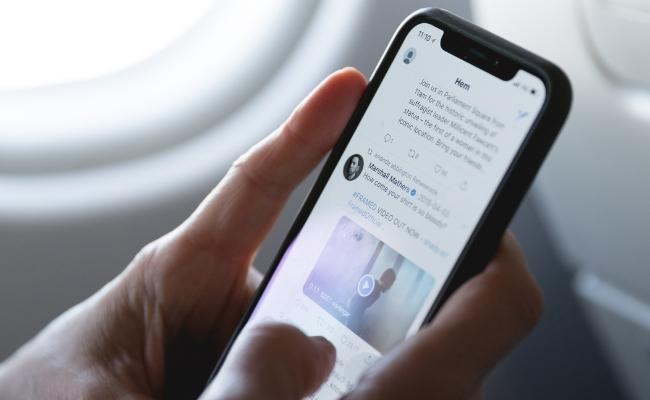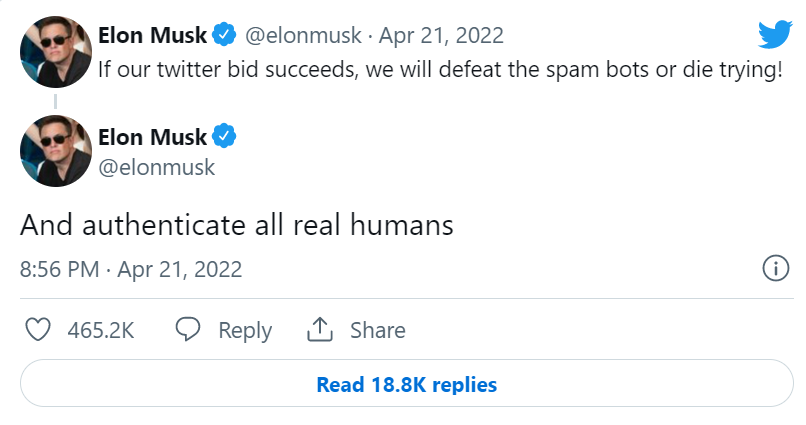A week ago, the Tesla CEO’s acquired one of the most popular social media in the world. Let’s see what could be the impact for marketing activities on the app.
The state of Twitter
In what could be one of its final quarters as a publicly-traded company, the app reported revenue of $1.2 billion for the Q1 of 2022, an increase of 16% versus the Q1 of 2021.
According to its latest quarterly report, published on 28 April, Twitter has 229 million daily users worldwide who are considered “monetizable”, i.e. sufficiently active on the platform to be likely to be exposed to advertising each day, its main source of funding. This number is up 15.9% compared to Q1 of the prior year. Moreover, Twitter reaches around 436 million monthly users, according to a January 2022 ranking. This makes it the 15th most popular social network in the world.
Elon Musk’s acquisition
After becoming Twitter’s largest shareholder on April 4, Elon Musk bought the entire company on Monday April 25, surprising everyone. The $44 billion worth acquisition is considered to be one of the largest leveraged buyouts in history but also one of the most substantial and unusual deals in tech history. But this is not just a simple takeover, the billionaire intends to shake things up on the platform.
Even if we’re still not 100% sure about Tesla’s owner projects, his public statements have thus far enlightened some of his intentions.
- First of all, he wants to take Twitter private in order to reduce the platform’s reliance on ads even if he knows perfectly that they are Twitter’s main source of revenue.
- Taking Twitter into private ownership will enable it to be freer in what it allows. Thereby, safeguarding speech on the platform. Musk is a true advocate of the US First amendment. Indeed, Musk has often criticized Twitter’s moderation and ban system.
“Free speech is the bedrock of a functioning democracy, and Twitter is the digital town square where matters vital to the future of humanity are debated.” Elon Musk
15 to 20 minutes is the lifetime of a tweet, 5.9 million pieces of content were deleted in the first half of 2021. This is what Elon Musk wants to tackle. However, he will still need to follow the regulation in the UK and EU regarding content moderation and harmful speech.
- Twitter estimates that 23 million accounts are held by bots. This is one of Mr Musk’s main battles, “to defeat the spam bots or die trying!”. Bots were a long-time issue for Twitter, but with the market pressure on usage numbers, maybe the app turned a blind eye to some suspicious profiles. By going private, this constraint would disappear and then let Twitter take stronger decisions on bot accounts.
- In order to get completely rid of these bots, Twitter’s new owner desire to authenticate real people and give them the blue checkmark. In Musk’s head, Twitter could thus become a hub for more engaged, active and accountable conversation and content. However, people would need to pay for Twitter Blue 3 dollars per month. Knowing that almost half of Twitter users (44%) have never actually posted a single tweet and 500 million people come to Twitter every month without logging in. So would people really be ready to subscribe monthly to have access to Twitter? Not all of them for sure. It raises the question of elitism and preventing poorer regions and users from using the social media.
What does it hold for marketers?
Twitter is already known as a kind of toxic social media platform where misinformation and online harassment are very common. This online environment was already not super secure for brands and many of them do not expand their strategy on this app for brand safety reasons. For that very special matter, Twitter has launched a significant number of privacy and safety controls for users over the past years. But also, more comprehensive content moderation policies in order to tackle the biggest flaws of the app.
However, as we are witnessing Elon Musk’s intentions to shake up everything and to liberate free speech on Twitter (which can be already seemed as super free and tricky for some businesses), marketers are concerned. With the potential changes to the content moderation policies and the suppression of ads, marketing in general but also influencer marketing won’t always feel suitable on the platform anymore.
“Brands are becoming more conscious of their adjacency to risky content or disinformation, so they may take their dollars to other channels with greater safety measures in place,” Forrester research director Mike Proulx and principal analyst Kelsey Chickering
This new direction could really be a pity when we know that Twitter is often used when a customer wants to reach out to a brand as it’s super easy. Around 51% of tweeters want brands to listen to customers rather than help them to improve their knowledge. Twitter is a space of conversation for brands and users. But if those same brands don’t feel safe on the app anymore with what seems to be coming, this dialogue will disappear.
The authentication and subscription system of the social media would also penalise advertisers. The Twitter population wouldn’t be the same anymore so not all brands would have an interest in promoting on the app except maybe some niche industries (tech, crypto…). It could open new opportunities for influencer marketing in emerging industries.
Even if these are only predictions, Elon Musk’s new role in Twitter governance may surprise us. No matter what the future of Twitter is, at TERRITORY Influence, we create unique strategies for you taking into account all emerging challenges. Interested?


